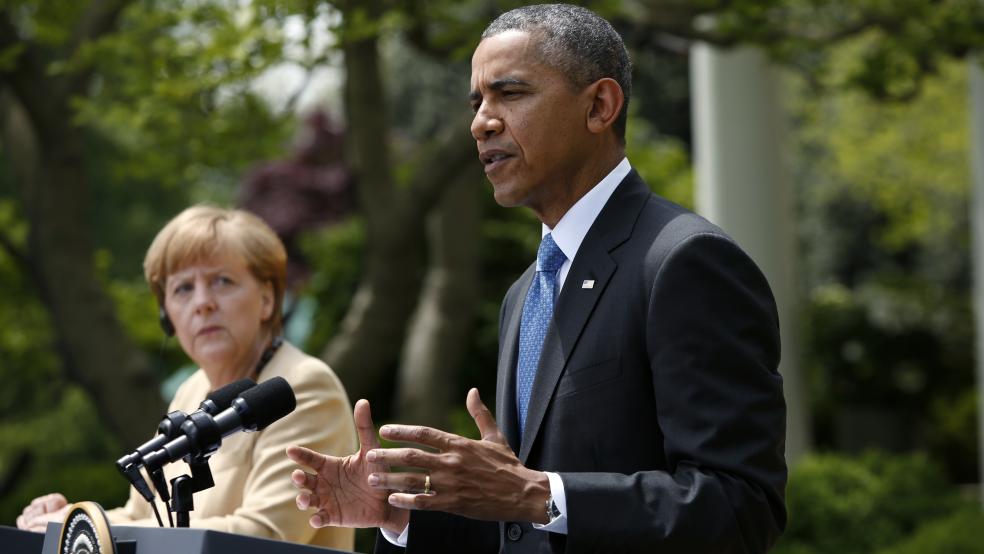Relations between the United States and Germany have been quite complicated in recent years, veering from the highs of the early Obama administration to the lows of the current accusations that the CIA had recruited German workers to snoop on Angela Merkel’s government.
When President Obama first visited Berlin in 2008, he was greeted by hundreds of thousands of Germans who viewed him as an historic figure that would lead the United States away from the missteps of George W. Bush. After years of hostility between Berlin and Washington, the German political establishment viewed Obama as a cosmopolitan politician who would work with Europe instead of ignoring it.
Related: Obama Has A New Scapegoat: Now It's Germany's Fault!
A lot has changed since then; revelations about the NSA targeting Merkel and the CIA espionage plot have sunk German-American relations to historic depths. However, that hasn’t stopped a prominent German journalist from suggesting that Obama has more in common with German politicians than many believe.
In an op-ed in The New York Times, Clemens Wergin, the foreign editor of the newspaper group Die Welt, suggested that Obama’s international policies more closely align with those of moralizing yet passive German politicians.
“At the height of the Syria conflict and just after yet another of Barack Obama’s speeches, I suddenly understood the problem with this American president and his foreign policy. He sounded just like a German politician: all moral outrage, but little else to help end one of the most devastating civil wars of our age,” Wergin wrote. “President Obama, I thought with a sigh, has become European.”
The accusation that Obama was European in his political style has been around since the Berlin speech in 2008. It’s a familiar charge made by Republicans who want to paint well-educated and globetrotting Democrats as out of touch with middle class Americans.
Related: 50 Years After Kennedy, Obama Isn't 'Ein Berliner'
Obama brushed off the charge in 2008 on his way to a monumental victory. But a close examination of his record shows that Wergin’s criticism is often right; on many occasions during many crises, Obama has favored words over actions.
For instance, Obama promised action in Syria if evidence of chemical weapons emerged. When evidence did emerge, he backed off.
Obama also withdrew American troops from Iraq in 2011. He watched from afar as the country descended into chaos. Now, as the Islamic State of Syria and Iraq (ISIS) threatens to split the country, Russian President Vladimir Putin is sending warplanes to Baghdad, while Obama dithers.
There are many other instances of Obama using rhetoric as opposed to action. But there is an argument that the American public is also becoming more European.
Related: How Europe and Obama Lost Leverage with Putin
Socialized medicine is now begrudgingly accepted in the States. The country is also becoming less religious at a time when church attendance in Europe is down. Americans are also having fewer children, just like Europeans. And Americans and Europeans are also spending less on defense.
Turning Inward
Joerg Wolf, editor of the think tank atlantic-community.org, disagreed with the notion that Obama and Americans are booming more European. Instead, he said that Americans, like Germans, are becoming more selfish and less interested in foreign affairs.
“In a sense, the US and Germany are becoming more similar, but that does not mean they will agree more often,” Wolf told The Fiscal Times. “And certainly, neither Germany nor the EU as a whole is going to fill the void left by the U.S.”
Wolf said that both Washington and Berlin are becoming far less interested in solving international problems, especially at a time when neither have strong influence over world affairs.
“The Middle East has to fix its own problems. The US and Europe don't have the will, but also lack the capabilities to fix the region,” Wolf said.
What Fills the Void?
What does the absence of strong leadership from the Americans and Europeans means for the rest of the world? For years during the Cold War, the democracies of the United States and Europe stood as a beacon of hope for the rest of the world. Now, they stand passive as the world evolves.
Other nations are more than willing to take their place. China is emerging as the leading economy of the 21st century. Vladimir Putin is threatening to take back territory lost when the Berlin Wall fell. Terrorist organizations are now vying for the future of the Middle East.
The results of America’s current isolationism are unknown. But history teaches important lessons. In the 1930s, American withdrew from the global stage to deal with the Great Depression. In its absence, Hitler advanced across Europe, eventually leading to World War II and the deaths of tens of millions across the globe.
This is not change Americans can believe in.
Top Reads from The Fiscal Times
- Why Vietnam Will Be the Next Nuclear State
- Japan’s Pivot Away from the West Leads Back to China
- Obama’s Former Syria Ambassador Slams U.S. Policy





